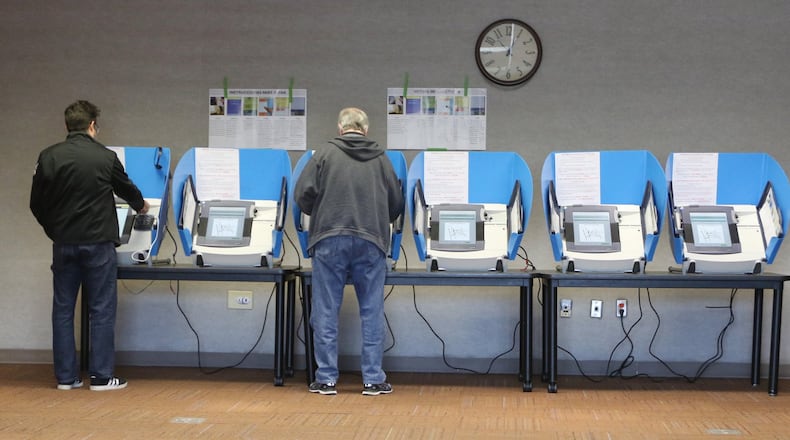The insides of Georgia's voting system will be cracked open for inspection as part of a lawsuit alleging that the state's elections are vulnerable to inaccuracies, malfunctions and hacking.
U.S. District Judge Amy Totenberg on Tuesday ordered election officials to allow computer experts to review databases used to configure ballots and tabulate votes.
The ruling comes in a lawsuit by election integrity advocates who doubt the accuracy of Georgia's electronic voting machines and are asking Totenberg to require that elections be conducted on paper ballots filled out with a pen.
The review of election management databases is needed to understand what caused problems during November’s heated race for governor between Republican Brian Kemp and Democrat Stacey Abrams, said Bruce Brown, an attorney for some of the plaintiffs.
Voters reported that voting machines failed to record their choices, flipped their votes from one candidate to another and produced questionable results.
"We can see the system malfunctioning, and everybody knows it is intrinsically vulnerable," said Brown, who represents the Coalition for Good Governance, a Colorado-based organization focused on election accountability. "We're trying to learn more about the exact causes of the particular problems we're seeing in Georgia."
Georgia Secretary of State Brad Raffensperger’s attorneys objected to allowing a review of election databases, which have a variety of information including candidate names, party affiliations, ballot layouts and vote counts for each precinct. The databases don’t contain confidential information, Totenberg wrote.
The state’s lawyers said disclosure of the databases would reveal the inner workings of Georgia’s election system and show hackers how to infect it with malware.
“We are disappointed that Judge Totenberg has ordered us to give sensitive election infrastructure to those who seek to disrupt Georgia’s elections,” said Tess Hammock, a spokeswoman for Raffensperger. “There is no evidence that Georgia’s voting machines have ever been hacked or that the vote count has ever been manipulated.”
The plaintiffs in the case disagree.
The Coalition for Good Governance has also challenged the results of the race for lieutenant governor, in which there were about 127,000 fewer votes recorded than expected compared with other statewide elections. That case is now being considered by the Georgia Supreme Court after a superior court judge dismissed the case in January.
Totenberg required the state to turn over the databases on CDs or electronic media by Friday. Those databases can be installed in a secure location and on a limited number of password-protected computers that aren’t connected to the internet.
She decided that limiting access to election databases would have prevented computing experts from being able to conduct a thorough examination of potential flaws in the state’s voting systems.
Totenberg ruled in the fall that the state's electronic voting machines posed a "concrete risk" to secure elections, but she declined to order a switch to hand-marked paper ballots just weeks before November's election.
Now, she’s considering a renewed effort to remove Georgia’s 17-year-old voting machines from service before this November’s municipal elections.
Those old machines are already set to be replaced with a system that includes paper ballots before next year's presidential primary election. The plaintiffs in the lawsuit intend to challenge the integrity of Georgia's next voting system as well, arguing that it will have the same security risks as the state's existing voting machines.
“No one is trying to disrupt Georgia’s elections. We’re just trying to make them safer,” Brown said. “We want to know more about the persistent problems voters in Georgia know about. This is a review the secretary of state should have done a long time ago but hasn’t.”
About the Author
Keep Reading
The Latest
Featured




